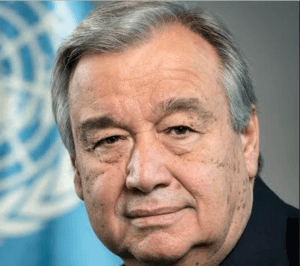Reforms to global governance architecture vital in bridging divide – says UN

Antonio Guterres, the United Nations (UN) Secretary-General, has called for deep reforms to the global governance architecture to help in rebuilding trust among nations.
“The institutions and frameworks of global governance, from the Security Council to the Bretton Woods system, were created 80 years ago.
“We cannot build a future for our grandchildren with a system built for our grandparents,” he stated in an address at the 2024 World Economic Forum (WEF), in Davos, Switzerland.
Inequality and injustice had reached obscene levels, he asserted, noting that the trend was a serious obstacle to sustainable development.
“Geopolitical divisions are a major risk factor affecting our faltering global economy. Political instability is adding to economic insecurity,” the UN Secretary-General lamented.
The UN is worried the geopolitical divide is preventing nations from coming together around global solutions for global challenges.
“When global norms collapse, so does trust. And I am personally shocked by the systematic undermining of principles and standards we used to take for granted.” Mr Guterres stated.
He said it was unfortunate that so many countries and companies were pursuing their own narrow interests without any consideration for “our shared future or our common good.”
“And I am certain that unless we take action, we can expect much, much worse. So let us be clear: Rebuilding trust is not a slogan or a public relations campaign.
“It requires deep reforms to global governance to manage geopolitical tensions during a new era of multipolarity,” the UN Secretary-General said.
Over the years, some UN members have been calling for reforms in the organisation’s structure, especially with the UN Security Council, describing it as outdated, pertaining to the complexities of today’s global challenges.
Ghana’s President, Nana Addo Dankwa Akufo-Addo, for instance, has been very vocal in championing reforms, insisting on immediate modifications to bring the Council in conformity with the current trends.
In his address at the 78th Session of the UN General Assembly, he said the reforms were long overdue.
The President asserted at the gathering of world leaders that the UN, in its current shape, “cannot continue to preach democracy, equality and good governance around the globe.”
“We cannot insist on peace and justice in the world, when our global organisation is seen by the majority of its members and the people of the world as hampered by an unjust and unfair structure.”
The UN Security Council was created after World War II to maintain world peace, however, it was largely paralyzed in the following decades by the cold war between the US and Union of Soviet Socialist Republics (USSR) (succeeded by Russia) and their allies.
It consists of 15 members, of which five are permanent – China, France, Russia, United Kingdom (UK) and United States (US).
According to the Secretary-General, the UN would fully engage this year in efforts to bring the global governance architecture up to date, rooted in equality and solidarity, based on the UN Charter and international law.
He hinted that, in September, the authorities would host a Summit of the Future, focused on solutions.
The Summit will consider essential reforms to the global financial architecture to make it responsive to the current challenges and representative of today’s world, including countries in the Global South that were under colonial rule when it was created.
Reforms to the Security Council, and a proposed New Agenda for Peace, would also help to prevent and resolve conflicts, rebalance geopolitical relations, and give developing countries a proportionate voice on the global stage, Mr Guterres noted.
Juxtaposing the current global security situation to what transpired some decades ago, he said “during the Cold War, the world faced terrible regional conflicts and moments of great danger.”
But there were systems in place to promote stability and predictability, including initiatives on arms control and nuclear hotlines.
“Today, many of these systems have been eroded or undermined. Instead of nuclear disarmament, there is talk of nuclear re-armament.
“States are spending billions making their nuclear arsenals faster, stealthier and more accurate. The Cold War era of two superpowers was followed by a brief period of unipolarity.
“Now, some analysts predict a totally chaotic situation, in which geopolitical divides at all levels prevent any global response to global threats.
“I strongly believe it is possible to prevent this disastrous scenario. I am confident we can build a new, multipolar global order with new opportunities for leadership, balance and justice in international relations,” he argued.
The 2024 World Economic Forum (WEF) opened with a call for global cooperation.
Professor Klaus Schwab, Founder and Executive Chairman of the Forum, explained the diverse and profound challenges the world faced, urging the participants to come together in addressing issues such as the geopolitical tensions, revitalising global growth and the potential of Artificial Intelligence (AI).
Ursula von der Leyen, President of the European Commission, said this is “a time to drive global collaboration more than ever before.”
“Europe is uniquely placed to foster this global solidarity and cooperation,” she said.
Source: GNA
